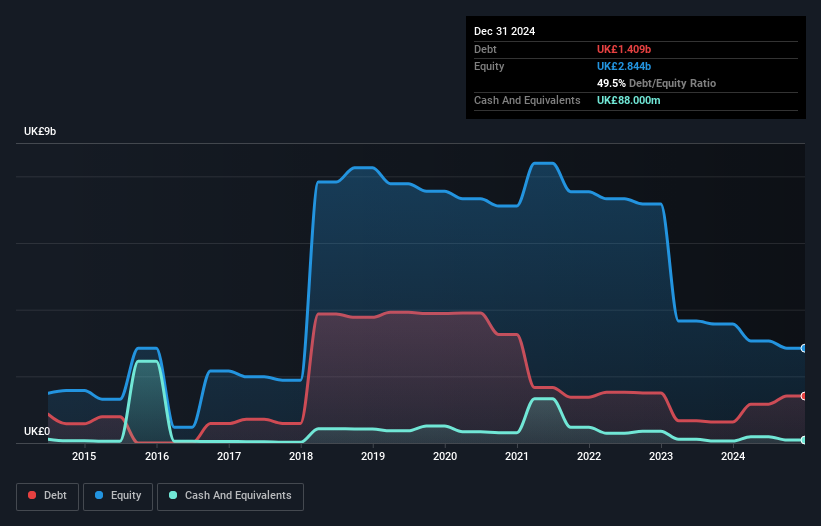- United Kingdom
- /
- Aerospace & Defense
- /
- LSE:MRO
Does Melrose Industries (LON:MRO) Have A Healthy Balance Sheet?
David Iben put it well when he said, 'Volatility is not a risk we care about. What we care about is avoiding the permanent loss of capital.' So it might be obvious that you need to consider debt, when you think about how risky any given stock is, because too much debt can sink a company. As with many other companies Melrose Industries PLC (LON:MRO) makes use of debt. But the more important question is: how much risk is that debt creating?
When Is Debt Dangerous?
Debt assists a business until the business has trouble paying it off, either with new capital or with free cash flow. Ultimately, if the company can't fulfill its legal obligations to repay debt, shareholders could walk away with nothing. However, a more common (but still painful) scenario is that it has to raise new equity capital at a low price, thus permanently diluting shareholders. Of course, plenty of companies use debt to fund growth, without any negative consequences. When we examine debt levels, we first consider both cash and debt levels, together.
What Is Melrose Industries's Net Debt?
You can click the graphic below for the historical numbers, but it shows that as of December 2024 Melrose Industries had UK£1.41b of debt, an increase on UK£630.0m, over one year. However, it does have UK£88.0m in cash offsetting this, leading to net debt of about UK£1.32b.

How Strong Is Melrose Industries' Balance Sheet?
Zooming in on the latest balance sheet data, we can see that Melrose Industries had liabilities of UK£1.75b due within 12 months and liabilities of UK£2.84b due beyond that. On the other hand, it had cash of UK£88.0m and UK£921.0m worth of receivables due within a year. So it has liabilities totalling UK£3.58b more than its cash and near-term receivables, combined.
This deficit is considerable relative to its market capitalization of UK£5.54b, so it does suggest shareholders should keep an eye on Melrose Industries' use of debt. Should its lenders demand that it shore up the balance sheet, shareholders would likely face severe dilution. There's no doubt that we learn most about debt from the balance sheet. But it is future earnings, more than anything, that will determine Melrose Industries's ability to maintain a healthy balance sheet going forward. So if you're focused on the future you can check out this free report showing analyst profit forecasts.
View our latest analysis for Melrose Industries
Over 12 months, Melrose Industries reported revenue of UK£3.5b, which is a gain of 3.5%, although it did not report any earnings before interest and tax. That rate of growth is a bit slow for our taste, but it takes all types to make a world.
Caveat Emptor
Importantly, Melrose Industries had an earnings before interest and tax (EBIT) loss over the last year. To be specific the EBIT loss came in at UK£8.0m. Considering that alongside the liabilities mentioned above does not give us much confidence that company should be using so much debt. Quite frankly we think the balance sheet is far from match-fit, although it could be improved with time. However, it doesn't help that it burned through UK£244m of cash over the last year. So to be blunt we think it is risky. The balance sheet is clearly the area to focus on when you are analysing debt. But ultimately, every company can contain risks that exist outside of the balance sheet. Case in point: We've spotted 2 warning signs for Melrose Industries you should be aware of.
If you're interested in investing in businesses that can grow profits without the burden of debt, then check out this free list of growing businesses that have net cash on the balance sheet.
New: Manage All Your Stock Portfolios in One Place
We've created the ultimate portfolio companion for stock investors, and it's free.
• Connect an unlimited number of Portfolios and see your total in one currency
• Be alerted to new Warning Signs or Risks via email or mobile
• Track the Fair Value of your stocks
Have feedback on this article? Concerned about the content? Get in touch with us directly. Alternatively, email editorial-team (at) simplywallst.com.
This article by Simply Wall St is general in nature. We provide commentary based on historical data and analyst forecasts only using an unbiased methodology and our articles are not intended to be financial advice. It does not constitute a recommendation to buy or sell any stock, and does not take account of your objectives, or your financial situation. We aim to bring you long-term focused analysis driven by fundamental data. Note that our analysis may not factor in the latest price-sensitive company announcements or qualitative material. Simply Wall St has no position in any stocks mentioned.
About LSE:MRO
Melrose Industries
Designs and delivers aerospace components and systems for civil and defence markets in the United Kingdom, rest of Europe, North America, and internationally.
Good value with acceptable track record.
Similar Companies
Market Insights
Community Narratives





